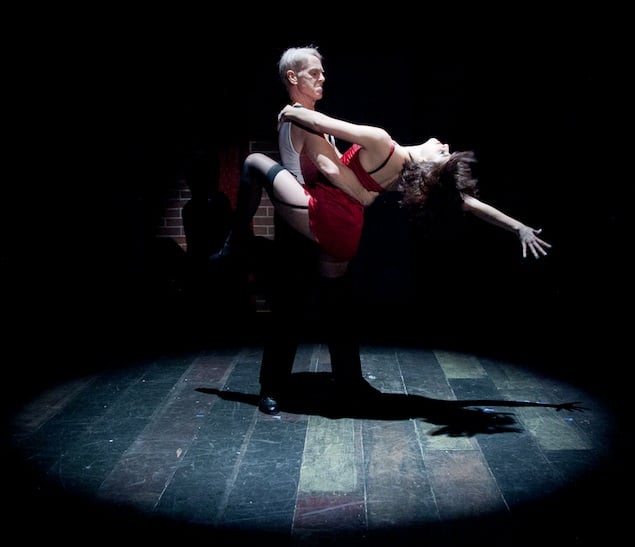
A night in Berlin on the eve of the Nazis’ rise to power doesn’t exactly sound like
a good time, but for the delinquent souls at the Kit Kat Club, the party goes on .
. . for the time being, at least. Adorned with writhing bodies and snare drum riffs,
the seedy nightspot at the heart of the Keegan Theatre’s production of
Cabaret is a cauldron of sin with a mischievous master of ceremonies stirring the pot. Dark
but lively, funny and sad, the mix isn’t just right, it’s also satisfying, with plenty
of flavor to spare.
The show, directed by Keegan company members Christina A. Coakley and
Michael Innocenti and based on the 1998 Broadway revival, is an ambitious undertaking. Cliff Bradshaw
(Bradley Foster Smith) is an American novelist who’s looking for his next story in 1930s Germany when he
discovers the Kit Kat Club. There, he’s caught up in the tawdry glamour and the spell
of its dizzying headliner Sally Bowles (Maria Rizzo). As political tensions mount outside, the pair’s relationship with each other and
those around them is tested, and reflected in the Kit Kat’s sultry and often symbolic
stage numbers.
Part omnisexual sideshow barker, part devious puppet master, the emcee (an absorbing
Paul Scanlan) is tasked with arguably the most difficult—and most fun—role, and Scanlan clearly
relishes the opportunity. The idea that his scantily clad host figure is somehow pulling
all the strings is believable with the actor’s leading presence, searing gaze, and
capable vocals. A pleasantly unexpected standout,
Stan Schulman as kindhearted Jewish fruit vendor Herr Schultz steals his own fair share of scenes,
leaving the audience rooting for his sweet, romantic subplot with a spinster innkeeper
(Jane Petkofsky).
Smith and Rizzo aren’t as engaging. Despite obvious talent and commitment, and a killer
take on the title song, “Cabaret,” near the play’s conclusion, Rizzo’s vocals—and
her British accent—can be inconsistent. Smith’s character is effective but doesn’t
come off as particularly layered or complex, though, to be fair, he doesn’t have the
musical numbers to explore that other actors in the show do.
The more straightforward acting is solid, if uneven at times, but the production is
at its best when it’s steeped in all its rouged, writhing, spotlit glory. Scanlan
commands a troupe of male and female Kit Kat Club dancers, decked out in clingy underthings
and armed with a mastery of vulgar pantomime and come-hither stares, and it’s when
that group takes the stage that the performances shine brightest. Part of that draw,
perhaps counterintuitively, seems to be the lack of shiny showgirl glitz. The women
perform in gauzy white bustiers and bloomers instead of black sequins; bruises, evidence
of hard living, show through pale skin and torn stockings. Skinny men gyrate in tattered
vests and powdered faces. Songs like “Money” are the most captivating because they
fuse the flashy sex appeal and choreography with a genuine rawness and pain.
Where certain aspects of the show are well served to forgo a certain polish, others
could use more. Rizzo’s accent is not the only one that drifts in and out. Some songs
incorporate a strange talk-singing where more committed belting or more committed
talking might have worked better. But overall, the good outweighs the not so good.
In the Keegan’s intimate space, the energy of the seamy club shines through, even
if the drama has a dark twist to it.
Cabaret
is playing at the Keegan’s Church Street Theater through February 23. Running time
is about two and a half hours, with one intermission. Tickets ($35 to $40) are available
via Keegan’s website.


















